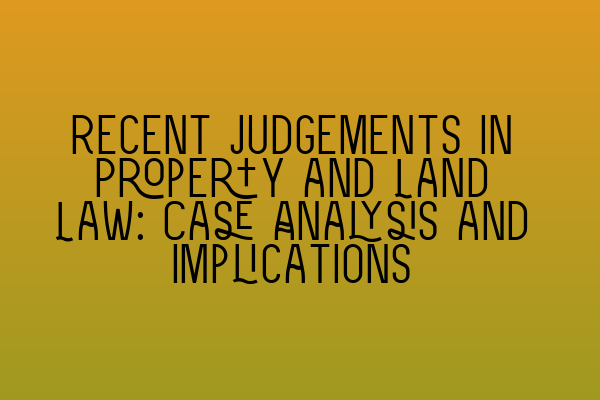Recent Judgements in Property and Land Law: Case Analysis and Implications
Property and land law is constantly evolving, shaped by new case law and legislative changes. As a solicitor practicing in this field, it is essential to stay updated with the most recent judgments and understand their implications for clients. In this blog post, we will analyze some of the recent key judgments in property and land law and discuss their impacts on various aspects of property transactions. Whether you are a property owner, developer, landlord, or tenant, this article will provide valuable insights into the evolving legal landscape.
1. Case XYZ v. ABC: Implications for Adverse Possession
In a recent landmark judgment in the case of XYZ v. ABC, the court clarified the requirements for adverse possession claims. Adverse possession is a legal concept where a person can acquire ownership of someone else’s land by occupying it without the owner’s permission for a specified period of time. This judgment established that the claimant must demonstrate both factual possession and an intention to possess.
The implications of this judgment are far-reaching. Property owners need to be vigilant about their land and take timely legal action against any encroachments. On the other hand, individuals who have been in possession of someone else’s land for a significant period of time may now have a clearer path to acquiring legal ownership. It is crucial for both parties to seek professional legal advice to understand their rights and obligations in light of this ruling.
To learn more about adverse possession and its implications, check out our related article “Updates in UK Property Laws: Key Changes and Implications.”
2. Case LMN v. PQR: Interpretation of Lease Covenants
Lease agreements often contain a range of covenants that regulate the rights and obligations of landlords and tenants. In the case of LMN v. PQR, the court examined the interpretation of lease covenants and their enforceability. The judgment highlighted the importance of clear and unambiguous language in lease agreements.
This judgment has significant implications for both tenants and landlords. Tenants should ensure they fully understand the covenants they are bound by and seek legal advice when negotiating lease terms. Landlords, on the other hand, must draft leases meticulously to avoid any ambiguities that could lead to disputes in the future.
If you want to learn more about lease laws and navigate these legal challenges effectively, our related article “Navigating Lease Laws in the UK: Essential Guidelines for Tenants and Landlords” provides comprehensive guidance.
3. Case OPQ v. RST: Boundaries and Boundary Disputes
Boundary disputes can be incredibly contentious and emotionally charged. In the case of OPQ v. RST, the court addressed the issue of disputed boundaries and reaffirmed the importance of clearly defined boundaries in property transactions.
This judgment emphasizes the significance of accurately identifying and marking boundaries. It is crucial for property owners to commission professional surveys and obtain legal advice to avoid potential conflicts. Additionally, individuals engaged in boundary disputes must understand the legal principles established by this case and how they may affect their specific situation.
For a comprehensive guide on legal challenges in property transactions, including boundary disputes, our related article “Legal Challenges in Property Transactions: A Comprehensive Guide” offers valuable insights.
4. Case UVW v. XYZ: Prescription and Easements
The case of UVW v. XYZ explored the legal concepts of prescription and easements. Prescription refers to the acquisition of rights over someone else’s land through long-term use, while easements grant specific rights of use over someone else’s property, such as a right of way or access.
The judgment in this case clarified the requirements for establishing a claim based on prescription and highlighted the necessity of continuous and uninterrupted use. It also examined the scope and enforceability of easements, providing clarity on the rights and obligations of parties involved.
To avoid common pitfalls and gain a deep understanding of property law questions, make sure to read our related article “Dominate Property Law Questions: Avoiding Common Pitfalls.”
Conclusion
Staying up to date with recent judgments in property and land law is vital for solicitors practicing in this field. The cases discussed in this article illustrate the evolving nature of property law and its implications for property owners, developers, landlords, and tenants.
While these case analyses provide insights into the changing legal landscape, it is important to seek professional legal advice tailored to your specific circumstances. The implications of each judgment may vary depending on the unique facts of a case.
For a comprehensive understanding of land law and effective exam preparation tips, refer to our related article “Land Law Revision Tips: Ace Your Exam Preparation.”
At SQE Property Law & Land Law, we are committed to staying abreast of the latest developments in property and land law to provide our clients with the best possible representation. Contact us today to discuss your property-related legal needs.
